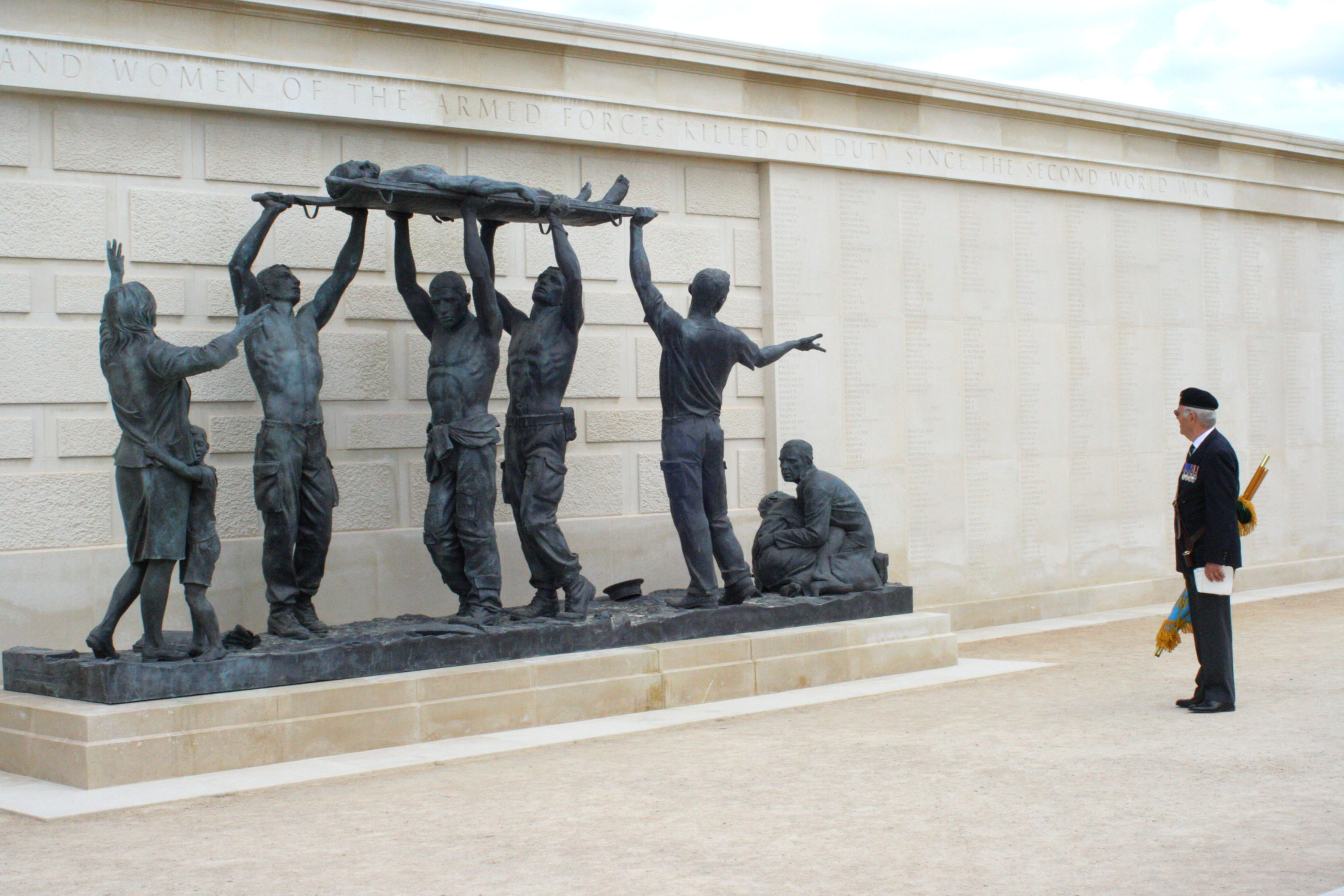
The National Memorial Arboretum
Exploring some of the memorials with South Asian connections at the year-round centre for Remembrance.
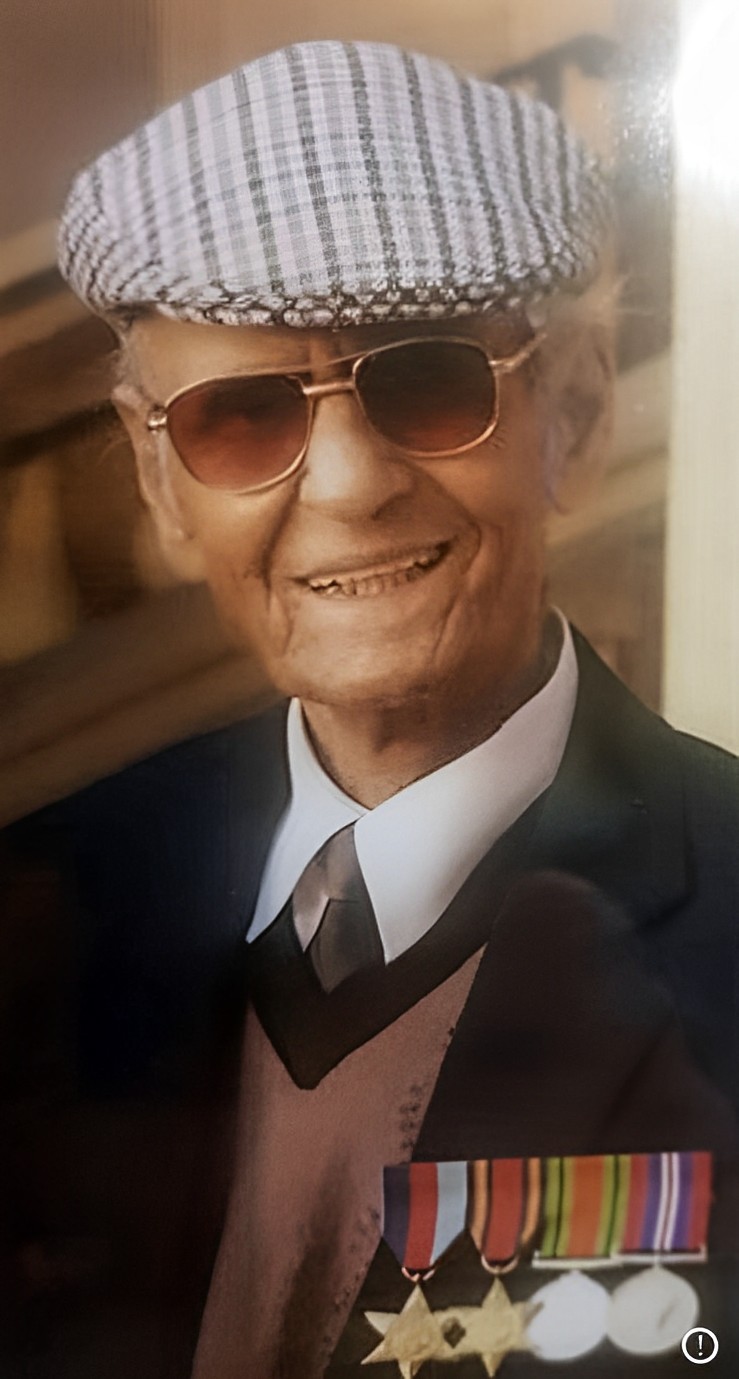
Sergeant Ghulam Hussain was born in a small village called Khambi, near Jhelum, in present day Pakistan on 21st March 1928.
As a young boy he would put on his older brother’s, Shamla (military headdress) and stomp around the rooms of their ancestral home. The brother, Fazal was his hero, a veteran who had travelled widely serving in the British Indian Army when the Second World War began.
He knew that at the earliest opportunity he would follow in his footsteps and enlist in the army. That chance came during the later stages of the war. He could finally follow the path of his hero.
As soon as enlistment opened, he travelled to Jhelum with a few of his friends. They went, hearts filled with hope which was soon deflated the moment the officer asked Ghulam his age: “Too young! come back when you’re older.”
The next day, Ghulam went back, lied about his age and joined the 16th Punjab Regiment. A lie, to be like his brother. Yet he had no idea how that lie would take him into the horror of jungle warfare.
When Mashuq Hussain OBE, a Senior Youth and Community Manager at Marsden Heights community college, was asked if his dad, Ghulam Hussain, was open in sharing stories of his service he answered, “No, not at all, he used to go into a bit of trance when you started talking about the War.”
Mashuq would often ask his dad about his service, but the response always returned to the statement, “I am so glad my children aren’t going to have to go through the same thing.”
The young Ghulam was sent to the harshest of terrains to fight in Burma, Sumatra and Java. A barely trained soldier, he was deployed quickly, as was the norm with Indian volunteers.
In the course of his service, he sustained injuries of broken ribs, a broken arm and finger, trench foot and chronic shoulder pain that he suffered until his death on 22nd March 2017.
According to Mashuq, he was always grabbing his right shoulder and rubbing it. The weight of the gun he commanded had left a mark on him.
During the Second World War, Burma (now Myanmar) was a strategic battleground. Japanese forces swiftly invaded in 1942, forcing out British and Allied troops. Three years of brutal fighting followed. Finally, allied troops, led by the British Indian Army, reoccupied Burma in 1945. The campaign was filled with challenging terrain, disease, close fighting, and high casualties. Allied victory restored the crucial India-China supply line and contributed to the overall defeat of Japan.
Ghulam was no stranger to the challenging terrains of Burma. He suffered severely from trench foot, a medical condition that mostly affects the feet, causing swelling, pain, numbness, tingling and discoloration of the skin.
“He suffered quite a lot with his feet. At later stages, he was always at the doctor, bunions and things like that.”
Ghulam’s stories of service experience
There was a handful of incidents Ghulam recalled to Mashuq on the rare occasions he spoke about his service.
One was fighting under the command of four British Colonels. He recalled when a Japanese bomber had attacked them and killed 14 staff officers including the commanding officer.
“He said, when we fought, you could never know where the enemy was, you never saw the enemy. You would be in the jungle and all of a sudden there’d be a gunshot and one of your comrades would go down, but you’d never know where it come from.”
Ghulam would later discover that the Japanese snipers would tie themselves high up in the trees to target the Allied troops.
Retreating to safety was filled with the dread of walking over the deceased bodies of soldiers and the smell of decaying corpses. The heat and humidity of Burma would have made a horrifying experience infinitely worse.
Ghulam was one of six siblings. His eldest brother Fazal was quickly taken as a prisoner of war during the Second World War and survived. His second eldest brother, Qadir, enlisted at the same time as Ghulam but they never fought together.
The most poignant moment for Ghulam was finally coming home and seeing his Mai (mother). Some of the young men that had enlisted with him never came back, and he remembered Dhara, a boy from his village, so coming back and seeing his Mai was a blessing.
It took him a long time to come to terms with his experiences after the war. Eventually he joined the Pakistan Police Force and then later the Postal service, as he wanted to be closer to his family.
Moving to the UK
In the early 1960’s Ghulam and his brother Qadir, received letters inviting them to work in the UK as they had served in the British Indian Army.
By this time Ghulam was married to Sarwar Jaan. He called his wife Jaan, which also means sweetheart.
Qadir moved first followed by Ghulam in 1964, the same year Mashuq was born. Ghulam had seven children.
He moved to Nelson, Lancashire, on his own but eventually his wife and children joined him, of which, the youngest was born in the UK.
Ghulam worked in the mills in Nelson. In the early days he sadly suffered from racist attacks going to and from work as he passed through the town centre.
Ghulam and his family often suffered from discrimination, with his sons and their friends frequently being targeted for attacks by white members of the community.
Mashuq believes that if his dad’s story of service had been told and the contribution of the Indian soldiers was taught more widely, his dad would not have been targeted for such appalling acts.
Ghulam would always dress in his best no matter the day. Influenced by his time in the army, that discipline stayed with him till his last day: “Suit and tie, shiny shoes and a flat cap in the latter days because I introduced him to the flat cap. Always clean shaved. I’d never seen a stubble on my dad.”
Mashuq fondly referred to his dad’s hair as the ‘Bobby Charlton’ and that he introduced him to a flat cap which he then incorporated into his style.
He recalled the rigorous daily ritual Ghulam had of setting up his equipment to shave, getting dressed in his suit and tie and eating porridge, a love he had adopted once he had moved to Britain, before setting off for the day.
In Khambi, to this day, Ghulam is revered as a soldier, a profession he always referred to himself as when asked of his occupation: “I’m a soldier.” When the military-style wedding bands play for weddings, they would always end the day by visiting the family home of Ghulam as a sign of respect. And Ghulam would visit the barracks in Jhelum whenever he could and would be referred to as ‘Sergeant’.
Yet in Britain his service was not recognised, he didn’t have a medal to his name.
That is until he met a colleague in the mills who was also ex-military and, at the time, a member of the Royal British Legion.
Obtaining his medals
Through the work of a member of the Royal British Legion, Ghulam was awarded his Second World War medals, 50 years after his service. He was awarded the Burma Star Medal, 1939-1945 Star, Defence Medal and Second World War Medal by the Mayor of Pendle. Mashuq was present on the day the Mayor attached the medals on his dad and it was a very proud moment for him. After retiring from work, Ghulam became very involved in the work of the RBL and would attend meetings every week, he fundraised during the Poppy Appeal and each year he attended the local Remembrance service.
He also travelled to schools and shared his story of service with the children. He was a pillar of the community, recognised by many.
He was eventually awarded the Freedom of Nelson by Nelson Council. The award gives public recognition of eminent service rendered to the people of the town over a long period.
Influenced by the service of his dad, Mashuq tirelessly volunteers in the community too, trying to bring the different communities together. He also saved the lives of two people, one a neighbour when a fire broke out in their home and another was a child who fell into a canal. Mashuq’s contribution to the community was recognised formally and when he was awarded an OBE, he was able to take Ghulam with him to Buckingham Palace to collect his medal.
Since his father’s death, Mashuq has attended the annual Remembrance service on his behalf, wearing his dad’s medals and laying a wreath. He proudly shares his father’s story of service and sacrifice.
When asked what he wants to share with the South Asian community Mashuq says:
“Do a family tree soon as you can. While the elders are still alive. Look at what we’ve done as people and be proud of what we’ve done and look at the positive rather than negatives. You don’t know where you’re going to go to if you don’t know where you’re coming from.”


Exploring some of the memorials with South Asian connections at the year-round centre for Remembrance.
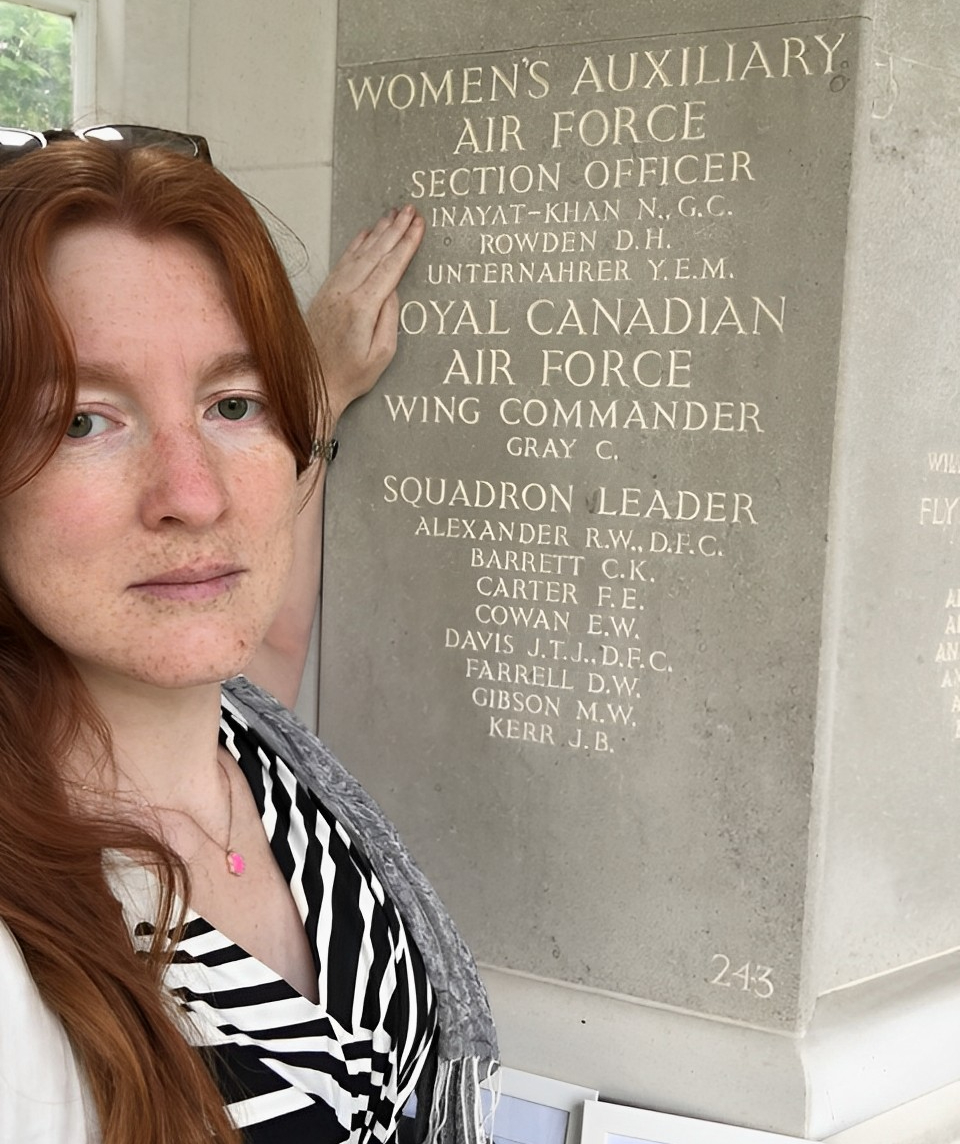
An aviation enthusiast’s special mission to honour a Second World War agent in occupied France.

The Indian Army Memorial Room stands as a tribute to the rich history and enduring spirit of the Indian soldiers of the British Indian Army.
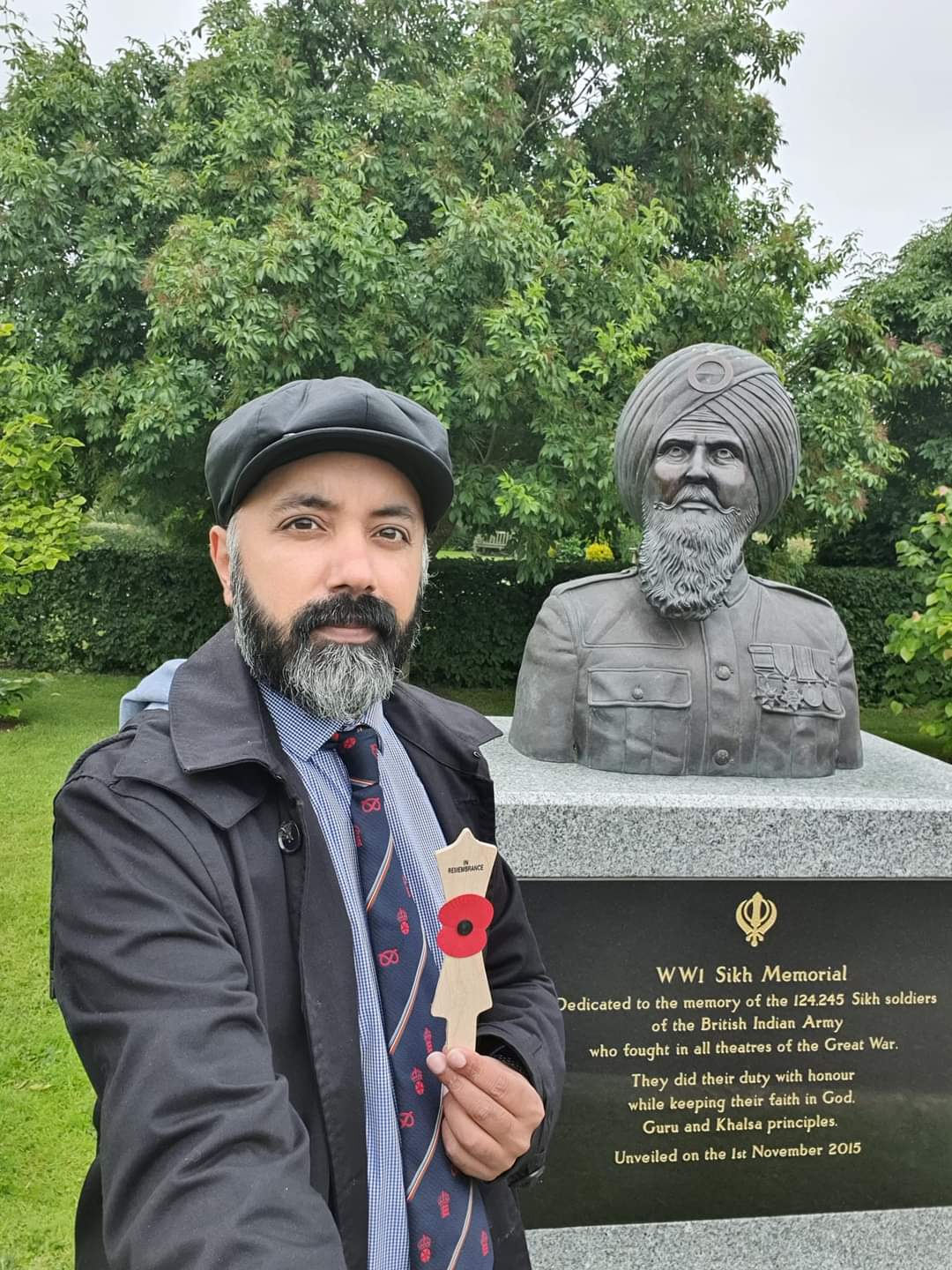
The story behind the tribute to commemorate the service of Sikh members of the Armed Forces.
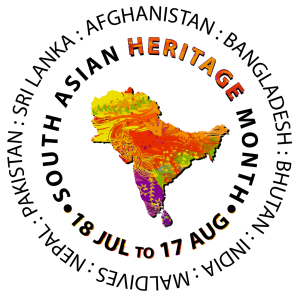
The first of the Trust’s projects is the South Asian Heritage Month (SAHM), which first took place in 2020 and runs from the 18th of July to the 17th of August each year.
SAHM seeks to commemorate, mark and celebrate South Asian cultures, histories, and communities.
It seeks to understand the diverse heritage and cultures that continue to link the UK with South Asia.


© South Asian Heritage Trust | All Rights Reserved